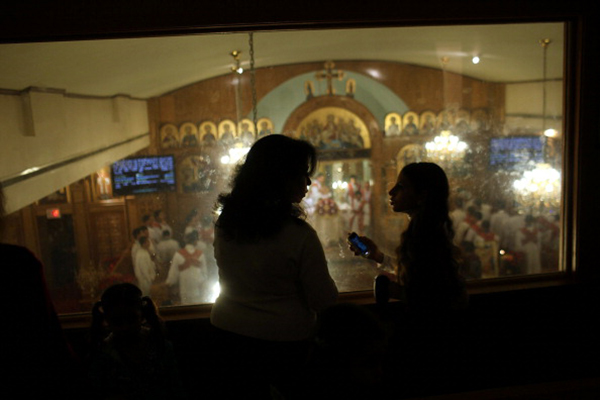
By Shady Negm, Special to the Tablet
CAIRO — Last January, the Egyptian embassy in Washington D.C. published a document titled “Strengthening National Unity: Religious Freedom and Diversity in Egypt” that claimed great progress in the treatment of Egypt’s Coptic Christians.
While the official rhetoric toward Copts in Egypt has changed under Abdel Fattah Al-Sisi, and become more tolerant, Copts still endure discrimination, sectarian violence, and terrorist attacks.
Coptic Solidarity, a Christian advocacy group in Virginia, criticized the embassy’s document, saying it contained numerous false claims, historical inaccuracies, and was highly misleading overall regarding the true situation for Copts.
The advocacy group published a fact-checking report addressing each claim in the Egyptian embassy’s document which was distributed by the lobbying firm Brownstein Hyatt Farber Schreck LLP on behalf of the Ministry of Foreign Affairs of Egypt.
According to U.S. media reports, the Egyptian government signed a $65,000-per-month agreement with the lobbying firm to assist with improving its image.
Coptic Solidarity’s fact-checking report highlighted 20 false claims in the embassy’s document.
While the document praised what is called the “Egyptian Family Home” initiative — a cultural communications campaign to facilitate religious tolerance — Coptic Solidarity argued that Family Home, and its local branches throughout the country, has been used as a tool for greater repression of the Copts minority. They say it happens through the use of informal reconciliation sessions in sectarian violence against Copts which results in impunity for perpetrators.
Coptic Solidarity said that Family Home was founded by the state’s security apparatus to eschew the government’s responsibility in combating “religious strife” by promoting the entity as a joint project between Al-Azhar and the Coptic Church to “defuse community tensions following sectarian violence.”
In another critical point, the Egyptian embassy praised the Customary Councils for facilitating resolutions between individuals in rural areas. On the contrary, Coptic Solidarity says, “the use of these Customary Councils to settle ‘disputes’ are utilized when Muslim mobs attack Copts and their properties. Coptic victims are typically intimidated and pressured to retract statements and charges in exchange for ‘protection’ in their villages, or for the release of imprisoned Copts.”
During these incidents of communal violence, when Muslim mobs attack Copts, their homes, and churches, local police typically arrest both Copts and Muslims, regardless of culpability. The arrested Copts are used as bargaining chips to assure Coptic cooperation during the customary council sessions.
Coptic Christian women have faced increasing attacks. On April 3, a Coptic Christian woman and her 6-year-old son were slaughtered by a Muslim driver who harassed her first. A heartbreaking video of her 4-year-old daughter, who seems to be in trauma as she saw the crime before escaping, went viral on social media.
In January 2020, Catherine Ramzi, a Coptic Christian mother who has four daughters, was walking home in the afternoon when a Muslim man tried to kill her because she wasn’t wearing a veil. The perpetrator pulled her head back and slit her throat with a knife.
Last December, an Egyptian court acquitted assailants who attacked, and dragged naked down the street, a 74-year-old Coptic Christian woman. The acquittal of three defendants — a father and his two sons — by the Minya Governorate criminal court provoked outrage among Coptic Christians and rights groups.
And it’s not only women under attack. On December 10, in the al-Wardian district of Alexandria, three brothers from a Muslim family attacked Coptic shops near St. Damiana Church, killing Ramses Boulos Hermina, 47, by stabbing him in the neck. His older brother, Adel, and their neighbor, Tarek Fawzi Shenouda, were seriously injured.
This week, Islamic State released a video of the execution of Nabil Habashy Salama, a 62-year-old Christian man in Bir Al Abd, a city in North Sinai. Salama was kidnapped by the terrorist group three months ago. In the video, they pledged to kill more Coptic Christians.
While the embassy’s document claimed that Meritocracy in the civil service leads Christians to senior government positions, Coptic Solidarity said that Copts are still seriously underrepresented and are subject to a limit of two percent of entries into the military and police academies and the various branches of the judiciary positions. They are totally absent in other “sensitive” services such as security apparatuses and the president’s administration.
“As if the institutionalized and systemic discrimination is not bad enough, the Egyptian government adds blatant insult; talking about ‘meritocracy’ unintentionally reveals the despicable official views that the Copts deserve what they are facing because of their inherent deficiency.” Coptic Solidarity added.
There are no Coptic Christians serving as president or vice-president in any of the government’s 25 public universities, which are financed by all taxpayers. The fact-checking report noted a Coptic judge who was reportedly denied a promotion in the Administrative prosecution due to her faith. A Muslim colleague who objected to the discrimination against her was fired in April 2018 and faces persistent reprisal acts.
Sports is another area of discrimination cited. There is not a single Copt on the national Egyptian soccer team, and there were no Copts in Egypt’s national delegation to the last two Summer Olympics. Egyptian clubs reject Christian players from joining their teams as soon as they hear their names. There are dozens of stories about Coptic Christian athletes who have been rejected by sports teams regardless of their performance.
In 2018, former Egypt international striker Ahmed Hossam, known as Mido, who played for some of Europe’s top soccer clubs, confessed in a TV interview that there is discrimination against Coptic players.
He wasn’t the first to talk about such prejudice. A lot of moderate Muslim journalists have written about the problems, especially in the era of social media where more Christian players talk about the discrimination that ended their dreams of playing professionally.
